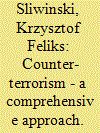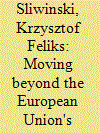| Srl | Item |
| 1 |
ID:
123563


|
|
|
|
|
| Publication |
2013.
|
| Summary/Abstract |
The global war on terror and 9/11 have brought to our attention the perpetual problem of freedom versus security. The more governments strive to provide security, the more they tend to curb the freedoms of their citizens. 'Stop and search' procedures, 28-day detentions of terrorist suspects without charge or new body scanners at the airports are just the 'tip of the iceberg' in a long list of the state's encroachments into our private lives. This paper departs from such a seemingly inescapable predicament. It analyses the role of the public in preventing, protecting and preparing for terrorist attacks under the British government's counter-terrorism strategy known as CONTEST. It explores two social phenomena that are being increasingly promoted by official authorities in the United Kingdom, namely, mobilisation of society and what the author terms 'civilianisation' of security. The latter is defined as a notion relating to non-military, voluntary organisations and the business/private sector, engaged by government but acting in its own right against terrorism threats. 'Civilianisation' of security is also conceived of as a potential tool to bridge the gap between two incompatible worlds of state security and personal freedoms.
|
|
|
|
|
|
|
|
|
|
|
|
|
|
|
|
| 2 |
ID:
135341


|
|
|
|
|
| Summary/Abstract |
Policy and research on European cyber-security remains formative compared to leaders in the field like China and the United States. This article evaluates the European Union (EU) as a cyber-security actor, asking fundamental questions concerning the EU's combination of prominence and obscurity, especially its limitations and prospects. Who and what is going to dominate the European response to cyber-security in the future? These questions are examined within the larger framework of liberal intergovernmentalism. The EU also is compared to the North Atlantic Treaty Organization (NATO), a point of reference to further understand the limitations and challenges ahead for the EU. Two major factors limit the EU as a cyber-security actor: its intergovernmental character, and the lack of collective vision on cyber-security with the EU and between member states. To play an important role in shaping cyberspace and cyber-security, the EU cannot treat the internet as simply a communication tool or trading platform. Cooperation and capacity-building measures are needed to allow EU member states to surpass mere coordination of their respective national cyber-security strategies. To succeed as a cyber-power, the EU should adapt new and different forms of cyber-power, from the compulsory through the institutional, to the structural and productive. Otherwise, coordination of national strategies for cyber-security of EU member states is the most the EU as an actor can aim for.
|
|
|
|
|
|
|
|
|
|
|
|
|
|
|
|